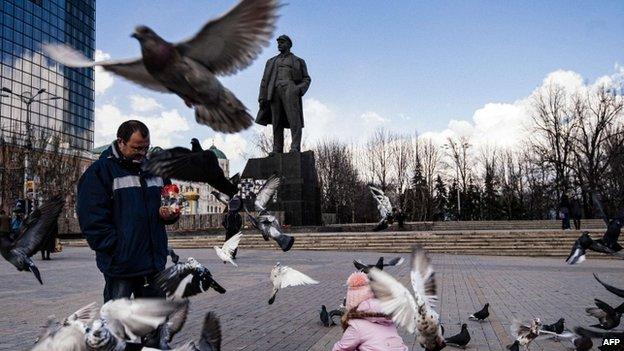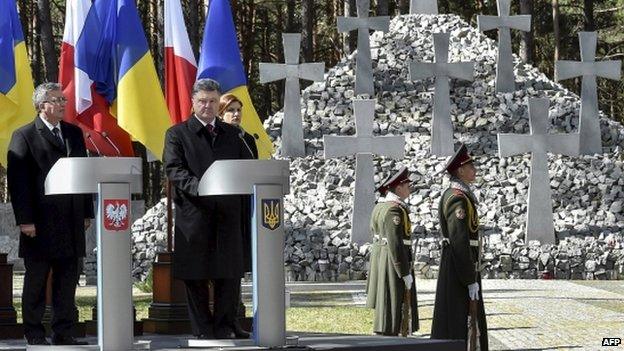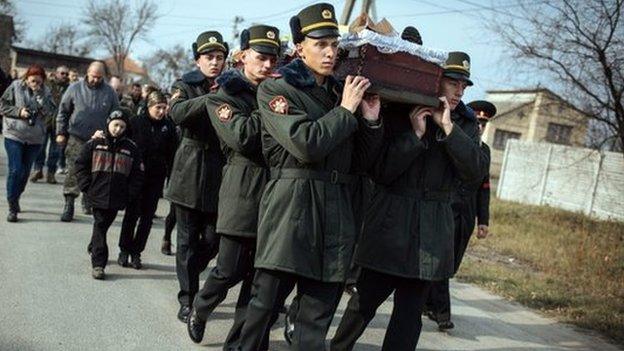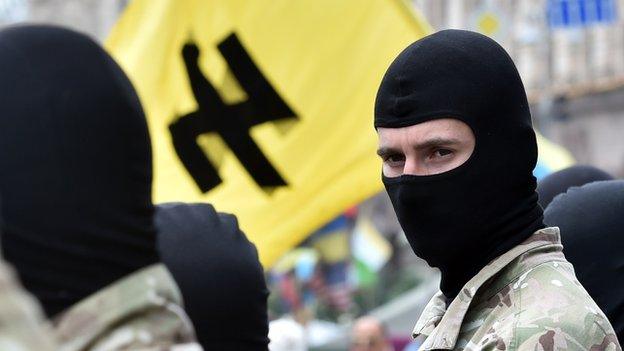Ukraine MPs back ban on Nazi and Communist propaganda
- Published

A statue of the late Soviet leader Vladimir Lenin stands in the rebel-held city of Donetsk
The Ukrainian parliament has voted to ban propaganda and symbols for "totalitarian Communist and Nazi regimes" in the former Soviet republic.
The list of prohibited items includes street names, flags and monuments commemorating Communist leaders.
Russia says it supports separatists in eastern Ukraine because of a "fascist threat from the Kiev government".
Separately, Ukrainian security officials said they had broken a plot to create a separatist state in Odessa.
Ukraine's SBU security service said it had arrested 29 people in and around the Black Sea port who were planning to create a independent region similar to the self-declared rebel republics in Luhansk and Donetsk.
'Criminal' character
A total of 254 members of Kiev's 450-member parliament voted in favour of the propaganda ban.

Ukraine's President Petro Poroshenko (second left) attended a ceremony commemorating the victims of Soviet-era repressions near Kiev on Thursday
The legislation, which still needs to be signed into law by President Petro Poroshenko, makes it illegal to deny the "criminal" character of Nazi and Communist regimes.
Ukraine gained independence after the collapse of the Soviet Union in 1991 and has recently been seeking closer integration with Western Europe.
Items prohibited under the bill include the Soviet flag and hymn as well as monuments and historical plaques commemorating Communist leaders, AFP news agency reports.
A fragile ceasefire is in force in eastern Ukraine in a bid to bring an end to months of fighting between pro-Russian rebels and government forces.
The Donetsk and Luhansk regions declared sovereign states in April.
SBU chief Valentyn Nalyvaychenko told a televised news conference on Thursday that security officers had broken up an organisation preparing to proclaim a similar independent state in Odessa "within the next few days".
He said the group was planning a campaign of assassinations targeting local politicians to destabilise the city. Officers had seized plans, maps, communication equipment, leaflets and banners, he added.
Russia has accused the government in Kiev of being controlled by "fascists" and extremists, focusing on Dmytro Yarosh, the leader of the Right Sector.
Ukrainian officials announced at the weekend that Mr Yarosh would serve as an adviser to the army chief of staff.
The Right Sector first burst to prominence as an ultra-nationalist umbrella organisation, battling riot police and helping man the barricades during anti-government protests last year.
- Published18 February 2015

- Published8 April 2015

- Published10 March 2015